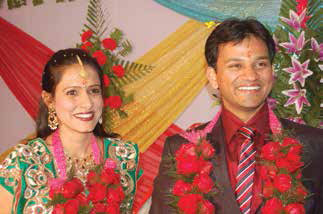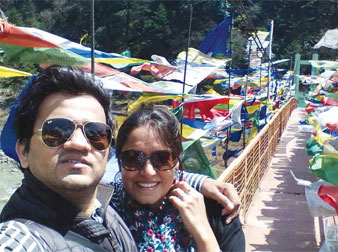
It is not often these days that a college romance fructifies into a wedlock. Corporate Citizen unlocks the story of love that has culminated into marriage, for we believe in the stability of a relationship and family unit. We bring to you real-life romances that got sealed in marriage
They are united not only in matrimony but also their mission in life: equitable education and healthcare for all. Former corporate professionals Santosh More and Khushboo Avasthi on giving up corporate careers, to start their very own NGO: Mantra4Change—and how they have zero regrets about walking the road less taken
“We are a unique couple. We argue not just at home — but also at work," laughs Santosh More, even as wife Khushboo Avasthi nods in agreement.
But that's not the only zone where this couple is different: in an era that prizes pursuit of material success—and all the toys that go with it—as the ultimate symbol of success, this young couple shows that a life well-lived goes beyond that. And so does a marriage.
"We are completely different individuals united by a shared passion for engineering social change through quality education for all. That keeps us together amongst other things," says Santosh.
Engineering graduates both, with promising turns in the corporate world—he as a software professional with Infosys, and she as a manager with the Teleradiology department of the Narayana Hrudayalaya Hospital in Bengaluru— it was a considered and joint decision to set up their own educational and interventional NGO, Mantra4change post their nuptials in 2013. "Neither of us could have done it if we both hadn't been together," says Khushboo.
Their friendship dates back to studying in the same school in Gaya, Bihar—after which they went their separate ways for further studies. They met again as young professionals in Bengaluru in 2007. From the outset, the duo had lots to talk about—and a shared passion for social work. "We really felt that we could use our corporate training for something very big," says Santosh.
The turning point came in 2009, when Santosh saw the Teach For India advertisement calling for the first batch of educated Indians who were willing to teach at the grassroot level with a view to transforming the country. "My parents and bosses at Infosys were surprised. But I managed to convince them—and gradually they realised how passionate I was about it," he says. Teaching was just one aspect of those life-changing two years. "I saw an India far-removed from what we know. Over and above all, my greatest learning from the Teach for India Fellowship was the value system that helps create an organisation," he says.
While Santosh was working as a fellow at TFI, Khushboo was doing her Masters from Tata Institute of Social Sciences (TISS), Mumbai. “It is at TISS that I was exposed to under-served communities. Our professors helped us explore an entirely different perspective of life. Working in slums with women and children was the most satisfying and gratifying experience of my life,” says Khushboo.
In 2013, after coming back to Bengaluru, both Santosh and Khushboo were spending a couple of hours teaching English to slum children near Banashankari (in Bengaluru). But they wanted to do more. The choice was between building new schools and working with existing schools. "We figured out that we would be able to reach out to a much wider audience if we worked with existing low-cost/government aided schools to upgrade their existing model," they share.
Essentially, the STEP intervention program by Mantra4Change works in three ways: empowering the school leadership; developing the teaching force and ensuring community participation. "It involves all stakeholders in a school system—school administrator, teachers, students, parents and the community —and is a two-year complete school immersion project. We become a part of the school system and drive the implementation of the programme. It is a two-stage process – first being the ‘need assessment’ phase and second being the ‘implementation’ phase," explains Khushboo.
But noble plans need financial backing. "Initially, we were both handling Mantra4Change along with our jobs. She pushed me to take it up full-time, even as she supported the endeavor by keeping her job. It was a tough call--but as she said: it was now or never,” he says. “We have been very fortunate with our work. Like they say, if you aspire to do well, the universe conspires to support you. We have got timely support from great mentors like Sanjay Purohit, Kumari Shibulal etc. Whenever we hit a roadblock on our journey of Mantra4Change.”, says Khushboo.
“The important thing is not to let fights fester. When anger continues, you lose out on precious time with your partner—ironically, the very same person—who brings so much brightness and happiness to your life,” says Khushboo

Despite their long-standing friendship, neither set of parents were gung-ho about their marriage initially. "She's a Brahmin; I am a Marwari. These things matter—especially in Bihar," says Santosh. "But her parents are highly educated—a school principal and professor respectively—and looked beyond the surface differences. Her mother, after a few meetings was convinced that I was the perfect match for her." Eventually, both sets of parents gave their blessing—as they realised how apt the couples were for each other.
"We are different, yet our strengths complement each others. I am spontaneous, talkative and outgoing. She takes her time opening up; has fewer friends and is very thorough and cerebral in her approach. It works beautifully for us—not just in our marriage—but also in running Mantra4Change," says Santosh.
His pride in her intelligence and achievements are considerable. "She is very smart. Always an academic topper, I appreciate how she uses her intelligence to advantage," he says. Khushboo takes pride in her "friendly, giving and thoroughly honest' husband. "He cares about those around him, and he is also extremely easy to talk to."
Finances after marriage have always been strained given that all their resources are devoted to Mantra. "We have a team of 13 in Bengaluru. All are on pay-roll," he says. "It's hard—but with the help of philanthropists and crowd-funding programs we are able to progress," he says. So doesn’t the duo miss the conventional trappings of yuppie success— namely fancy homes, cars and holidays? "Not for a minute," says Khushboo. "This was our conscious choice—and we stand by it. The work that we are doing is our best reward. We are blessed to have each other—and work towards our goal. Our home is always filled with our team and volunteers. It is so exciting," she says.
Santosh believes in helping out at home— through making hot cups of chai and shopping for the veggies. "But I like a nice, happy mess—though she keeps insisting on cleanliness," he grins.
But were there any adjustments to be made given their different cultures? "Yes—but in a very pleasant way. My parents are slightly old-fashioned but his family is very accepting of change," says Khushboo. "I am also very lucky to have the mother-in-law that I do. When she comes to visit—her presence is a strength for me. She helps me in the kitchen and takes care of me." Santosh reciprocates when it comes to Khushboo's mother. "Being a former school principal she is always very interested in our work, and keeps motivating us". Amidst the pressures of a rapidly visible NGO, the couple has learnt a way to keep work pressures away from home. "It's taken time but we have gradually managed to keep tensions away from our time together," says Khushboo.
So who apologises in case of a fight? "I do," says Santosh immediately. "I say sorry, and she agrees I have every reason to be sorry," he chortles. "The important thing is not to let fights fester. When anger continues, you lose out on precious time with your partner—ironically, the very same person—who brings so much brightness and happiness to your life," says Khushboo.
Both have simple—but realistic advice to offer. "Start your day together with a cup of tea. It sets the tone for the rest of the day," he says. She adds: "Trust and togetherness are completely integral to a marriage. We do little things together—and it adds up to the big things."
Now that's some 'Mantra' worth remembering.
By Kalyani Sardesai